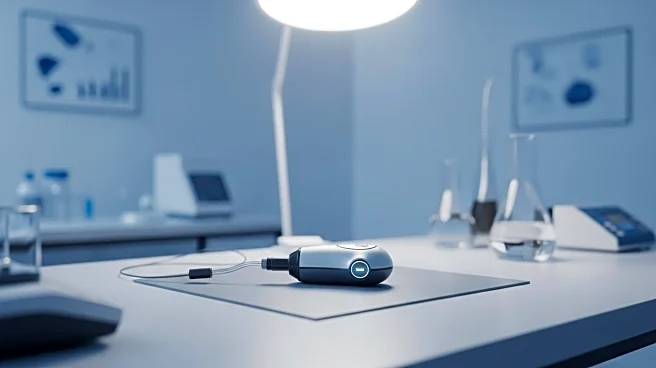What is the story about?
What's Happening?
Aspen Neuroscience has initiated Cohort 3 in its ASPIRO Phase 1/2a clinical trial for ANPD001, a personalized dopaminergic neuronal precursor cell therapy for Parkinson's disease. This marks the first administration of Aspen's commercial formulation of ANPD001, designed for scalable manufacturing and future clinical use. The new formulation ensures continuity with previous cohorts, demonstrating safety and tolerability without immunosuppression. Aspen's approach uses patient-derived cells, avoiding immune rejection and offering tailored treatment. The trial aims to evaluate the therapy's safety, tolerability, and preliminary efficacy in levodopa-responsive patients.
Why It's Important?
Aspen Neuroscience's advancement in the ASPIRO trial represents a significant step in developing personalized regenerative therapies for Parkinson's disease. With over one million people affected by Parkinson's in the U.S., ANPD001 offers a potential first-in-class opportunity to restore lost dopaminergic function. The therapy's autologous nature eliminates the need for immunosuppression, reducing associated risks and improving patient outcomes. Aspen's innovative approach could redefine treatment standards for neurodegenerative diseases, providing a scalable and consistent solution for personalized medicine.
What's Next?
Aspen Neuroscience will continue to advance its ASPIRO trial, focusing on demonstrating the safety and efficacy of ANPD001. The trial's primary endpoints will be reported at 12 months, with long-term follow-up extending to 15 years. Aspen aims to achieve commercial readiness for ANPD001, ensuring scalable manufacturing and streamlined clinical workflows. As the trial progresses, Aspen will work towards regulatory approvals and market access, potentially offering a transformative treatment option for Parkinson's disease patients.
Beyond the Headlines
Aspen Neuroscience's approach to Parkinson's disease treatment highlights the potential of autologous cell therapies to overcome challenges associated with immune rejection and immunosuppression. By using patient-derived cells, Aspen's therapy offers a personalized and precise treatment option, setting a new standard in regenerative medicine. The company's focus on scalable manufacturing and streamlined clinical workflows underscores the importance of commercial viability in advancing innovative therapies for neurodegenerative diseases.















